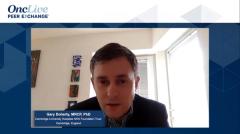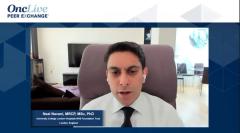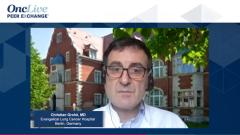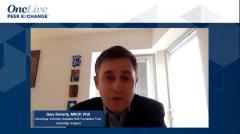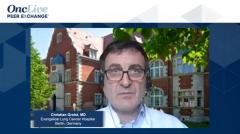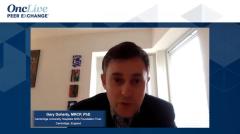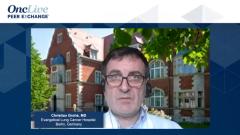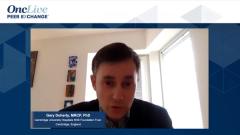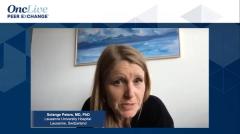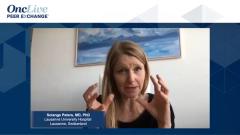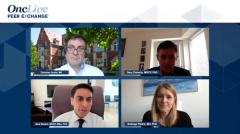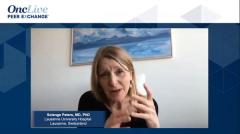
Molecular Testing in Resectable NSCLC
Solange Peters, MD, PhD, reviews factors to consider for molecular testing in early stage non–small cell lung cancer and discusses the role of single-gene assays and next-generation sequencing panels.
Episodes in this series

Neal Navani, MRCP, MSc, PhD: Hello and welcome everybody to this OncLive® Peer Exchange® entitled “Current Practices and Future Directions for Treatment of EGFR-Mutated Lung Cancer.” My name is Dr Neal Navani. I am a pulmonologist from University College London Hospital. Joining me today in this discussion are my colleagues: Dr Gary Doherty from Cambridge University Hospitals at University of Cambridge in England; Dr Christian Grohe from the lung cancer clinic in Berlin, Germany; and Dr Solange Peters from Lausanne University Hospital, in Lausanne, Switzerland. Today we are going to discuss a number of topics in EGFR mutation-positive lung cancer, including molecular testing, the use of EGFR TKIs [tyrosine kinase inhibitors] in the adjuvant setting, and strategies for EGFR inhibition in the treatment of metastatic disease. We are going to discuss the latest research in the field, and also the impact of recent clinical trials on making decisions around treatment selection. Let’s get started on our first topic. Our first topic is going to be molecular testing in resectable non–small cell lung cancer. Solange, if I could come to you, what are the issues regarding molecular testing of patients with resected lung cancer?
Solange Peters, MD, PhD: Thanks for the question. The main concern about this need, or I would say requirement, for molecular characterization of non–small cell lung cancer in early disease is that it was not, for a long period—I would say until now—routinely performed. And it was justified because at the time of surgery, and maybe during adjuvant chemotherapy, apart from having confirmation that the cancer was the cancer, you did not really need to know more before surgery would have happened. You probably did not need to know anything after surgery either; today, it will change. First of all, let me go a little aside. You will need to know PD-L1 expression, because we all know that characterizing the inflammatory component of the tumor might guide some decisions about neoadjuvant or adjuvant treatment. More than that, we now like to know at least some of the genetic alterations called oncogene addiction.
For example, EGFR, in today’s discussion, will let us know exactly why you would like to know if EGFR is mutated or not. In terms of follow up, there are some other alterations you’d like to know about: for example, ALK, because of the brain’s prevalence in terms of metastases in the subsequent follow up. We would now like to be more informed in terms of getting to the right decision, but also in terms of being able to speak to the patient in a way that might be slightly different. Today at least knowing about PD-L1, EGFR, ALK, and ROS1 would be desirable. Are we still in a time where we are going to do these genetic alterations one by one? Or are we in a time now where we can consider NGS [next-generation sequencing]? I would say it is even cheaper and simpler to use reflex NGS because these tumors are not squamous by nature. That is what we are starting to do in our institutions, but again, this is not traditional. This is not routine. We need to move to precision oncology and start to make small panels for all patients with nonsquamous, non–small cell lung cancer, at any stage.
Neal Navani, MRCP, MSc, PhD: That is great, thank you. Solange, you know that patients with an early stage lung cancer very often will have a biopsy first, either a CT-guided biopsy or perhaps via EBUS [endobronchial ultrasound]. Then they will have the surgical specimen as well. In your practice, do you test before or after surgery?
Solange Peters, MD, PhD: Well, for oncogene addiction, for drivers, I usually do reflex testing when I have a real piece of tissue, meaning after surgery. It is a pity to fail the NGS testing because of a lack of material. I would guess it might be slightly different in the future, if suddenly you start with lots of neoadjuvant strategies, which might make the tumor disappear. Still, for the time being, we try to make the best bet by testing on a real biopsy, meaning enough cells, more than 100 cells, for NGS testing. I do it on the surgical sample usually.
Neal Navani, MRCP, MSc, PhD: Going forward, do you think we are going to have to test prior to surgery, given some of the ongoing advances in the neoadjuvant setting, particularly regarding immunotherapy [IO]?
Solange Peters, MD, PhD: I think we will have to. First of all, it is possible that some trials lead us to think that PD-L1 shouldn’t be known before neoadjuvant treatment. Also, you might behave slightly differently in terms of neoadjuvant IO or chemotherapy-IO if you have to face an EGFR-mutated non–small cell lung cancer. Remember, osimertinib is not a friend of checkpoint inhibitors because of toxicity. There are things you would like to know before you give a checkpoint inhibitor, which has such a long half-life. Then you are stuck with a combination with osimertinib. My guess is yes, at the time this establishment of neoadjuvant treatment with IO might happen, it’s probable that the effort of trying to test in the initial biopsy will have to be pursued, but this is tricky, right? We diagnose lung cancer by EBUS very often. It is going to be one of the difficult paths to go through. I would say to remember that for drivers, whatever biopsy you use, it is fine to find the driver; it’s not supposed to change, but the material is a limiting factor.
Transcript Edited for Clarity


